Cute yet troublesome squirrels charm us with their lively antics but frustrate us by targeting our hard-grown tomatoes. The struggle to enjoy our tomatoes makes finding ways to outsmart these creatures crucial. This article presents 16 strategies for gardeners to protect their tomatoes, ensuring they can enjoy the fruits of their labor.
Don’t Miss: Exploring Tomato Netting: Types and Their Advantages
Why Squirrels Love Tomatoes
Squirrels gravitate towards nuts, seeds, and fruits, making tomatoes a perfect fit due to their juiciness and nutrients. In the richer summer and autumn food months, they actively seek out food, storing some for the winter. This natural drive leads them to explore any food source.

Squirrels Eating Tomato Plants
Their remarkable climbing and jumping skills make it hard to keep them out. Thus, squirrels become unwelcome guests in our gardens, driven by their quest for food and sharp environmental awareness.
How to Keep Squirrels Away from Your Tomatoes
We’ve found 16 smart ways to keep squirrels from eating tomatoes, blending natural approaches with physical barriers to safeguard your plants.
1. Install Tall Fences
Given squirrels’ remarkable jumping and climbing abilities, fences must stand at least 5 to 6.5 feet tall to keep them away from tomato plants effectively. Squirrels are also adept diggers, so bury the bottom of the fence at least 6 to 8 inches deep to prevent them from burrowing underneath.
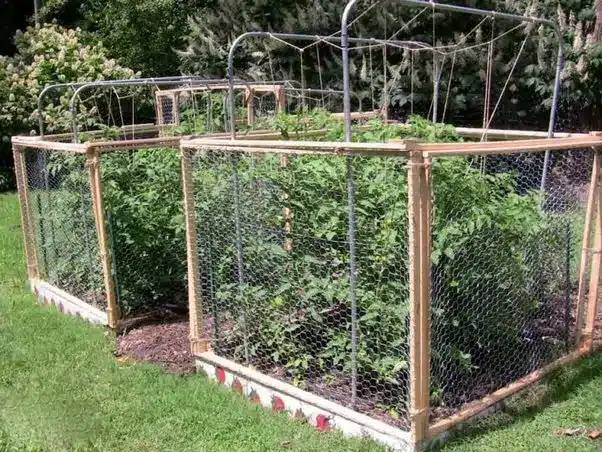
Tall fence for stopping squirrels
2. Use Protective Netting
Netting serves as an effective barrier against squirrels. Opt for wire mesh with small openings or most bird nettings to ensure proper ventilation and sunlight while preventing squirrel access. Ensure the netting covers the entire plant and is securely fastened, preventing squirrels from sneaking in through the edges.
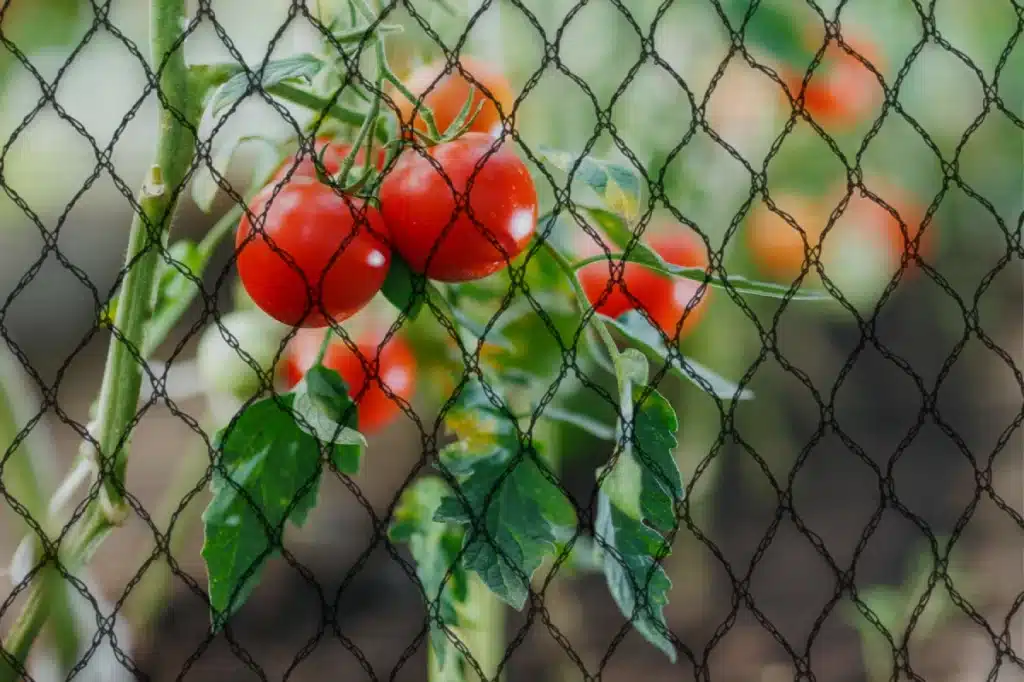
Bird netting for tomato plants
3. Try Portable Greenhouses
Employing greenhouses for growing tomatoes offers a unique and effective solution against squirrels, acting as a physical barrier while providing an ideal growing environment to boost tomato yield and quality. While commercial greenhouses are popular among large-scale growers, home gardeners might consider more affordable portable greenhouses.

Walk-in greenhouse – Amazon
4. Plant Squirrel-Repellent Companions
Planting garlic, onions, and hot peppers near your tomatoes can keep squirrels at bay, thanks to their strong smells. Aromatic herbs like basil and rosemary also deter squirrels from your veggies.
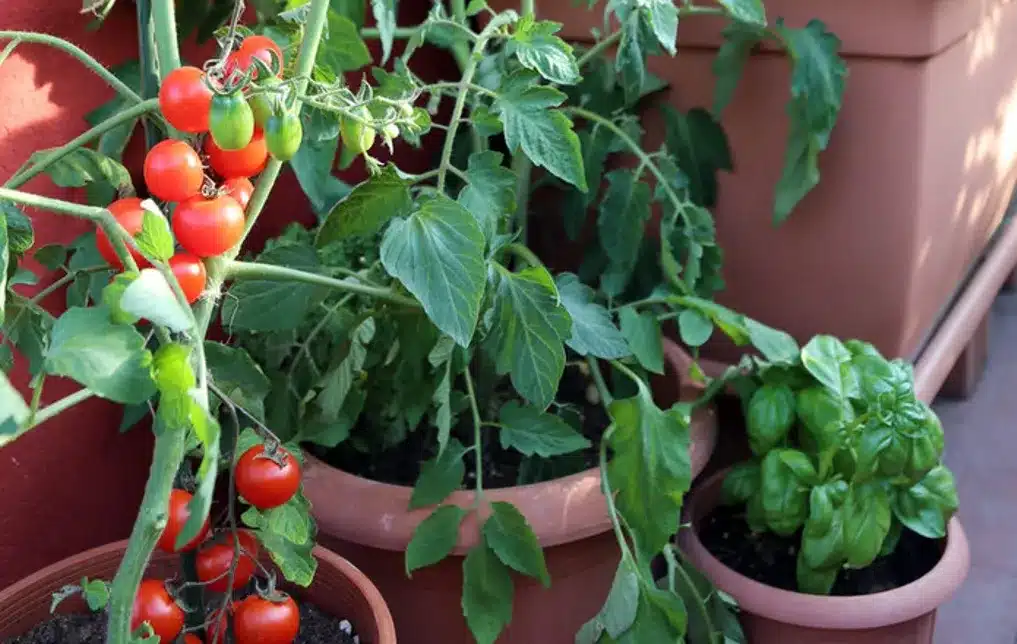
Plant Squirrel-Repellent Companions
5. Keep the Garden Clean
A tidy garden discourages squirrels. Regularly remove fallen fruits and nuts to eliminate their food sources. Make sure trash cans are securely closed and free of food scraps. Trim dense foliage and keep the lawn short to reduce hiding spots. Removing debris and garden waste lessens squirrels’ chances of finding a cozy spot in your garden.
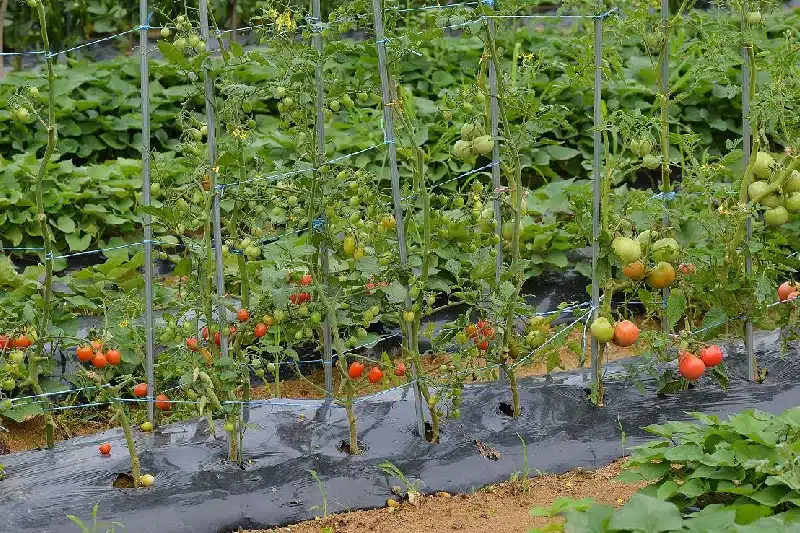
Keep the tomato garden clean
6. Natural Repellents
Natural repellents use scents and tastes squirrels dislike to keep them away from plants. For example, sprinkling cayenne pepper, spraying garlic solution, or even soapy water are effective natural deterrents. Apply these directly on plants and soil. Their strong scents deter squirrels. However, reapply these repellents regularly, especially after rain, to maintain their effectiveness.
7. Commercial Repellents and Devices
The market offers various commercial repellents and devices that protect plants by emitting squirrel-deterring chemicals or sounds. These products are convenient and long-lasting but can be costly. When choosing chemical repellents, ensure they are safe for people and pets. Some devices may disturb other wildlife or neighbors.
8. Sound and Light
Using sound and light is another contactless method to scare away squirrels. Ultrasonic devices emit sounds nearly inaudible to humans but extremely irritating to squirrels, keeping them away from certain areas. Similarly, intense flashing lights can frighten squirrels. However, squirrels may become accustomed to these methods over time and ignore them.

Ultrasonic devices used to anti-squirrels
9. Feeding Squirrels
Consider setting up a squirrel feeder with their favorite foods like nuts, apples, carrots, and tomatoes. If squirrels can access other food sources, they are less likely to raid your garden.
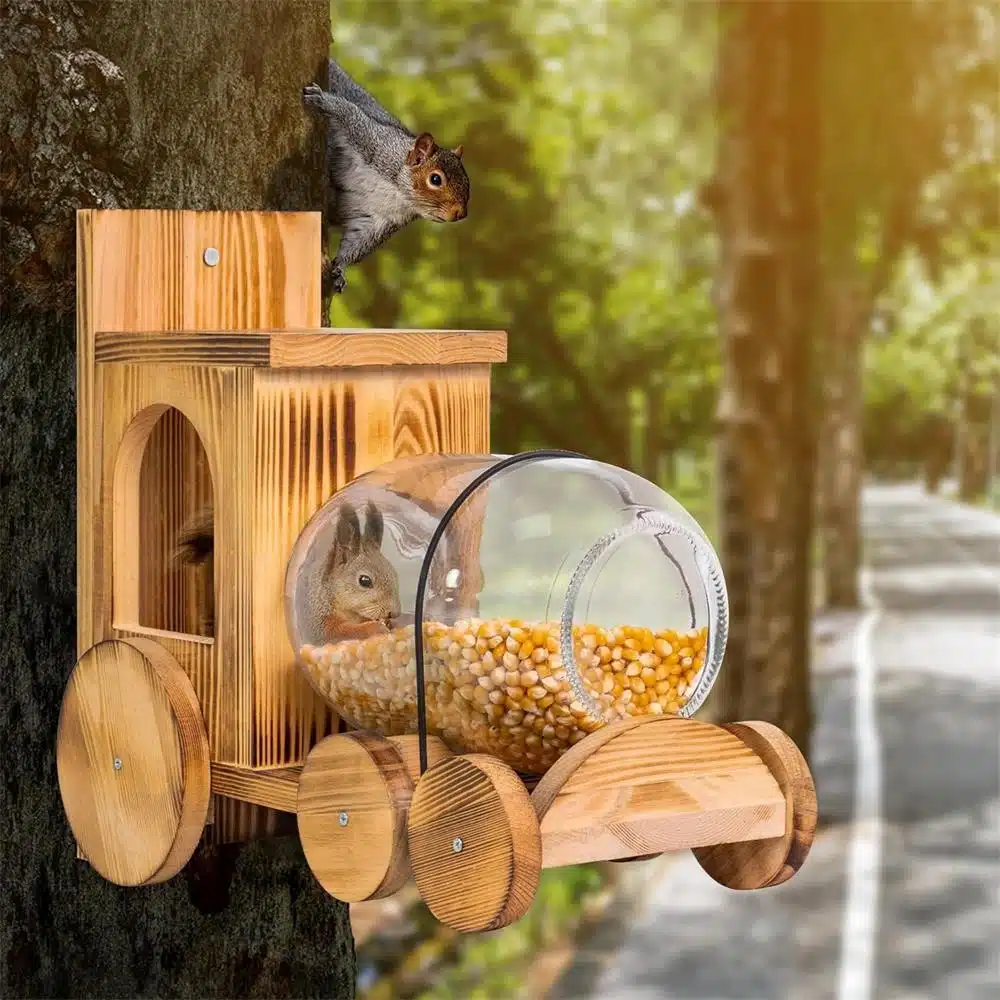
Squirrel feeder
10. Provide a Water Bowl
Sometimes squirrels nibble on tomatoes not because they want the fruit but because they’re thirsty. It might signify thirsty squirrels if you notice only small bites on your tomatoes. Placing a small water bowl near your garden can keep them hydrated and away from your tomatoes.
11. Scarecrow Method
Gardeners use scarecrows to keep birds out, and a similar tactic works for squirrels using owl decoys. Squirrels naturally fear owls and other predators. For fake owls or predator decoys to work, move them around often. This is similar to adding clothes to a scarecrow to make it appear more realistic and scare off birds.

Fake owls
12. Predator Urine
Squirrels are highly sensitive to their surroundings, especially smells that signal danger. Buying and spraying fox or coyote urine around your garden can deter squirrels. Like spraying pepper or garlic water, it’s most effective to apply after rain for the best result.
13. Water Sprinklers
Installing water sprinklers in your garden can deter squirrels. They certainly don’t enjoy getting soaked while attempting to steal tomatoes.
14. Adopt Cats or Dogs
Cats and dogs are among the best deterrents for squirrels, as chasing them is natural. Sometimes, the pet’s scent in the garden is enough to scare squirrels away. Scatter some shed fur from your cat or dog around your tomatoes when they ripen to keep squirrels at bay.

Adopt a dog – best deterrents for squirrels
15. Embrace Them
As the saying goes, “If you can’t beat them, join them.” Plant one to two times more tomatoes than you need, sharing your garden with the squirrels. They’ll feast on the extras, leaving plenty of fresh tomatoes for your table.

A lot of tomatoes
16. Hire Professionals
Professional pest control services also offer squirrel deterrence. Consult local companies for their services.
Conclusion
These 16 strategies can protect your tomatoes from squirrels. Effective measures are crucial in safeguarding your home garden from these nimble creatures. However, no method guarantees 100% effectiveness due to squirrels’ strong adaptability. They may grow accustomed to certain deterrents over time. Thus, the most effective approach often combines and adjusts multiple strategies to fit your situation.
Physical barriers might work best in some cases, while natural repellents or sound devices could be more appropriate in others. Alternatively, using a mix of methods might yield the best results. Through trial and error, you will surely find joy in a bountiful harvest.